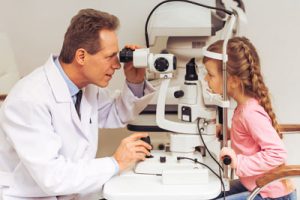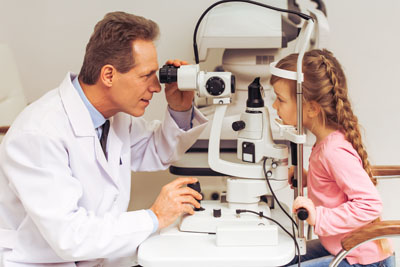
There are a variety of conditions that an optometrist can diagnose and treat. This goes far beyond examining the eyes to determine how well a person sees. While that is important, and we always recommend annual or biannual examinations, there is far more to eye health than how clearly a person sees at a distance or up close. In fact, there are a variety of eye conditions that if left untreated can lead to permanent damage including blindness. It is therefore incredibly important to visit our office on a regular basis for a full and comprehensive eye examination.
Some people should have an examination more frequently
Some people are at an even greater risk for long-term health problems and should visit an optometrist on an annual basis. This includes:
1. Diabetics
We can conduct a diabetic eye exam to make sure that a person's vision is not deteriorating due to an eye disease caused by diabetes. Since diabetes can restrict blood flow to areas of the body, it is possible for the condition to negatively impact eye health as well. This damage can be permanent but if caught early on, there are treatment options available to help minimize the impact and prevent blindness.
2. People with a family history of eye disease like macular degeneration
Anyone who has a family history of serious eye diseases or blindness should visit us regularly for a comprehensive exam. While family history does not always indicate there will be a problem, it is a concern that warrants further monitoring.
3. Smokers
Smokers are at a greater risk of experiencing all sorts of health problems, including problems related to the health of the eyes. We suggest that anyone who smokes, do what is necessary to quit. In the meantime, it is wise to schedule a regular examination.
Early intervention is key
If an eye problem is identified, like glaucoma or macular degeneration, early intervention will be key to the prevention of deteriorating vision. With surgeries, procedures and even medication, it can be necessary to treat a variety of eye health problems or to stop or slow their progression. Given how critical vision is to daily living, anything that can stop or slow the deterioration of vision is worth considering. Unfortunately, if a person does not make an eye examination, these early intervention methods may no longer be an option. For example, if the condition is diagnosed too late, certain procedures and medications may no longer be effective.
Knowing what signs to watch for can also be helpful in reaching an early diagnosis and being able to treat conditions as they arise. Some warning signs include:
- Decreased peripheral vision
- Seeing spots or dots
- A halo around lights at night
- Grainy vision
- Pain or pressure in the eyes
- Rapid decrease in the ability to see up close or far away
Schedule an appointment and protect your vision
The best way to protect vision is to visit an optometrist on a regular basis. We invite you to call our office and schedule an appointment so that you can do so.


